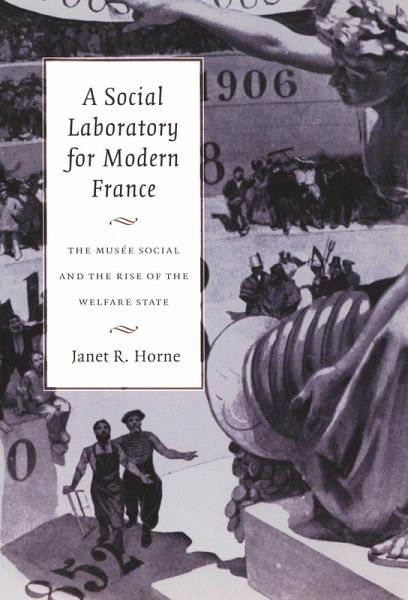
Social Laboratory for Modern France (eBook, PDF)
The Musee Social and the Rise of the Welfare State
Versandkostenfrei!
Sofort per Download lieferbar
144,95 €
inkl. MwSt.
Weitere Ausgaben:

PAYBACK Punkte
72 °P sammeln!
As a nineteenth-century think tank that sought answers to France's pressing "e;social question,"e; the Musee Social reached across political lines to forge a reformist alliance founded on an optimistic faith in social science. In A Social Laboratory for Modern France Janet R. Horne presents the story of this institution, offering a nuanced explanation of how, despite centuries of deep ideological division, the French came to agree on the basic premises of their welfare state.Horne explains how Musee founders believed-and convinced others to believe-that the Third Republic would carry o...
As a nineteenth-century think tank that sought answers to France's pressing "e;social question,"e; the Musee Social reached across political lines to forge a reformist alliance founded on an optimistic faith in social science. In A Social Laboratory for Modern France Janet R. Horne presents the story of this institution, offering a nuanced explanation of how, despite centuries of deep ideological division, the French came to agree on the basic premises of their welfare state.Horne explains how Musee founders believed-and convinced others to believe-that the Third Republic would carry out the social mission of the French Revolution and create a new social contract for modern France, one based on the rights of citizenship and that assumed collective responsibility for the victims of social change. Challenging the persistent notion of the Third Republic as the stagnant backwater of European social reform, Horne instead depicts the intellectually sophisticated and progressive political culture of a generation that laid the groundwork for the rise of a hybrid welfare system, characterized by a partnership between private agencies and government. With a focus on the cultural origins of turn-of-the-century thought-including religion, republicanism, liberalism, solidarism, and early sociology-A Social Laboratory for Modern France demonstrates how French reformers grappled with social problems that are still of the utmost relevance today and how they initiated a process that gave the welfare state the task of achieving social cohesion within an industrializing republic.
Dieser Download kann aus rechtlichen Gründen nur mit Rechnungsadresse in A, B, BG, CY, CZ, D, DK, EW, E, FIN, F, GR, HR, H, IRL, I, LT, L, LR, M, NL, PL, P, R, S, SLO, SK ausgeliefert werden.













